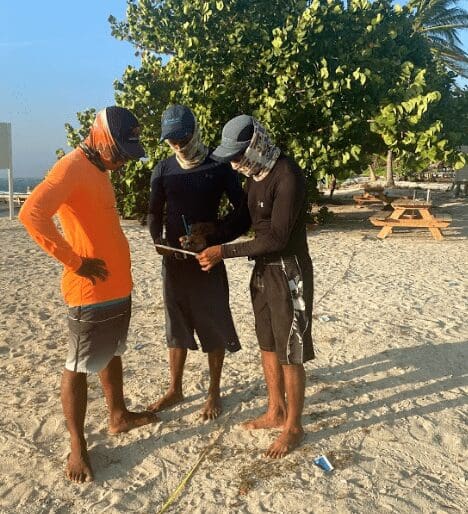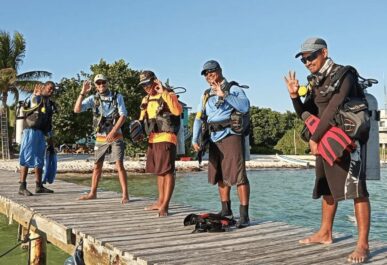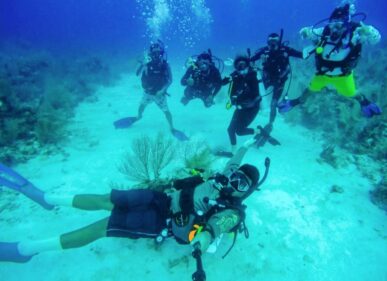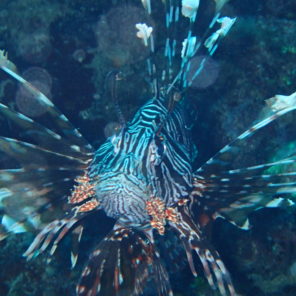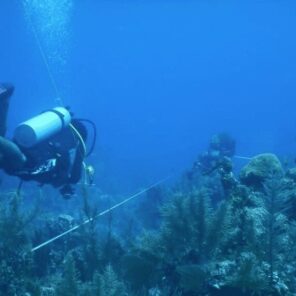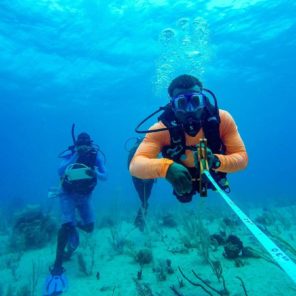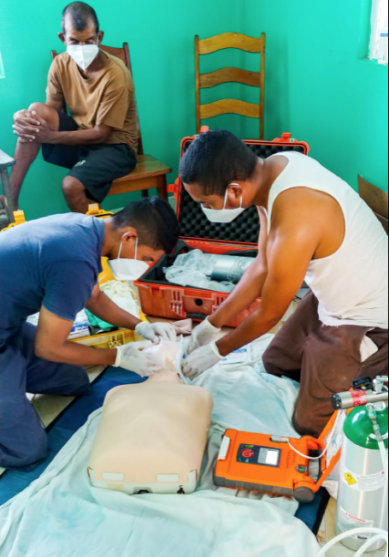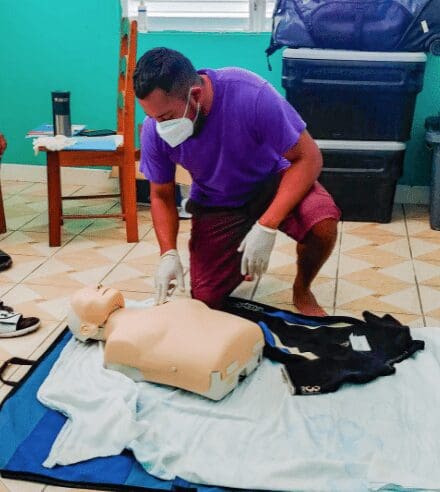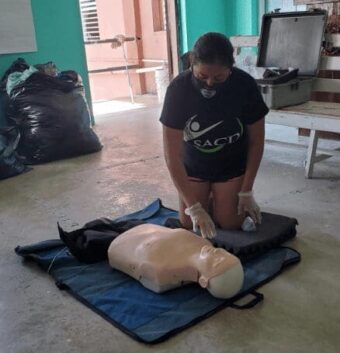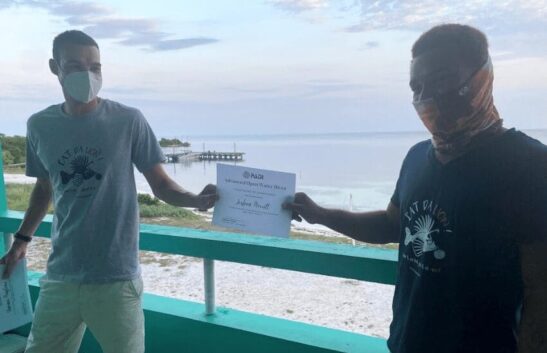The Pivot
I can clearly remember waking up at the crack of dawn to the view of a breathtaking sunrise and the voices of eager volunteers who couldn’t wait to gear up. The savory aroma from the kitchen lingered like mist in the air as our expedition cook prepared a local Belizean breakfast. The bell would ring, which meant that the food was ready. Immediately the volunteers would all stream out of their thatch cabanas, feeling charged and ready to feast before embarking on the day’s adventure. They had each traveled great distances to our remote camp in Bacalar Chico to dive, explore, and marvel at the majesty of Belize’s coral reefs. I had envisioned myself coordinating these expeditions and having this routine for years to come, but the pandemic changed everything!
In March 2020, like everyone else in the world, our team had to truly understand and grasp the concepts of resilience and adaptability to pave a way forward. Though there was much uncertainty, the Belize team saw an opportunity to pivot our work away from international volunteers to increase our support to community-based partners.
Having collaborated with the Belize Fisheries Department and other stakeholders to develop and launch the Belize National Lionfish Management Strategy in 2019, our work now seeks to ensure that this strategy is owned and implemented by the Belizean Government, protected area co-management agencies, and local resource users. To facilitate this, we have embarked on a journey to scope, partner, and build capacity with key stakeholders to effectively control and manage lionfish populations within Belize. Lionfish is an invasive species with the potential to disrupt the balance of marine ecosystems. Over the past two decades, they have been invading coral reefs throughout the Western Atlantic, Gulf of Mexico, and the Caribbean. Lionfish have no known predators, and they literally eat
everything! Their rapid population growth is an imminent threat to biodiversity and marine-based livelihoods which warrants an urgent call for action.
A participatory approach
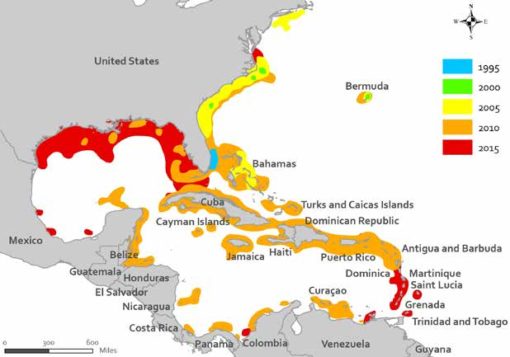
Map of the Caribbean showing the advancement of lionfish in five-year intervals. | Map: Fanny Tricone
As a Belizean, and as a conservationist, I am motivated by the work that our team plays in the execution of this strategy. Thanks to the support and funding from MAR Fund, the Summit Foundation, New England Biolabs Foundation, and The Waterloo Foundation, we have successfully partnered with the Turneffe Atoll Sustainability Association (TASA), who launched its first lionfish control plan in May 2021, as well as the Belize Fisheries Department and Sarteneja Alliance for Conservation and Development (SACD), who are working together to harmonise lionfish control across three protected areas: Hol Chan, Caye Caulker, and Bacalar Chico Marine Reserves.
It was a great experience in learning the LFS Methodology and receiving a refresher training on prey and predator species was great” – Andres Aldana, Park Director – Turneffe Atoll Sustainability Association
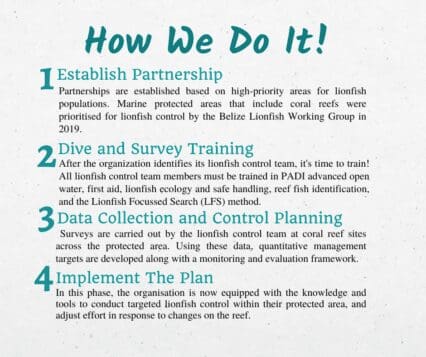
Infographic | Ronalee Mackenzie, Blue Ventures.
It has been truly fulfilling to broaden our network with local stakeholders and facilitate practical training that empowers and inspires its participants. Since March 2020, we have trained six people as lionfish brigadiers – meaning that they are fully certified in first aid, PADI advanced open water and the lionfish focused search survey method. My passion for marine conservation began with fieldwork so it brings me immense joy to see the excitement displayed by the participants as they learn these new technical skills. Their enthusiasm has been felt in every conversation that we had, in every lesson that was taught, and in every skill they perfected. Through this experience, I have built impactful connections, gained friends, and been inspired by their willingness to participate in the implementation of this strategy.
Working with the Blue Ventures team was amazing as we managed to establish 39 LFS sites within TAMR… we are grateful that through this partnership we were able to certify our TASA Staff as Advanced Open Water Divers.” – Andres Aldana, Park Director – Turneffe Atoll Sustainability Association
This is the beginning of a new era for our team here in Belize. Though our strategy has evolved, I am still able to enjoy the coordination of expeditions, since they are now tailored to facilitate training with our local partners. Back in the field, I am happy as I gaze at the picture perfect sunsets each day while working with Belizeans who have invested their time and talent into the implementation of this strategy.
I believe that the establishment of these partnerships will yield formidable results, build scientific capacity and strengthen the connection among local stakeholders who openly advocate for the protection and preservation of Belize’s marine environment.” – Celso Sho, Fieldwork Coordinator
Over the course of the next three years, we aspire to establish effective, participatory, and informed lionfish management across Belize’s MPA network. This will be guided by site prioritisation done by the National Lionfish Working Group, focusing on southern Belize (Gladden Spit and Silk Cayes Marine Reserve, and South Water Caye Marine Reserve), where we will partner with protected area co-managers and fisher associations. By prioritizing inclusion, we believe this participatory approach to invasive species management has the potential to streamline and strengthen conservation networks in Belize and beyond.
By Ronalee McKenzie (Fisheries Coordinator) and Celso Sho (Fieldwork Coordinator), Belize.


